LAPAN-Kyoto University International Symposium
for Equatorial Atmosphere
The 6th Asia Research Node Symposium on Humanosphere Science
(The 448th Symposium on Sustainable Humanosphere)
Date: September 20-22, 2021
Full Online Meeting
更新日: 2021/09/17
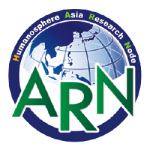 |
 |
 |
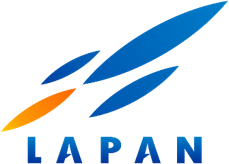
|
The environment surrounding humans is rapidly changing with complicated interlinkages, threatening sustainable development and healthy living. There has been an increasing demand for reliable future projections based on an accurate understanding of current conditions of Humanosphere, and for the presentation of measures for solving the problems. To establish the Sustainable Humanosphere, international collaboration and expansion of Humanosphere Science on a global scale is important.
In 2016, Research Institute for Sustainable Humanosphere (RISH) launched a program called the Humanosphere Asia Research Node (ARN) to strengthen the hub functions of international collaborative research and fostering talented people who expand the field of Humanosphere Sciences internationally. ARN integrates our various facilities and human networks in ASEAN region and Japan for consolidating the international collaborative research on “Sustainable Humanosphere”. We have held a series of symposia on Humanosphere Science: the 1st ARN Symposium in Penang, Malaysia in collaboration with Universiti Sains, Malaysia (USM), the 2nd one in Uji, Japan, the 3rd one in Taichung, Taiwan in collaboration with National Chung Hsing University (NCHU), and the 4th one in Nanjing, China in collaboration with Nanjing Forestry University (NFU). In last year, the 5th symposium was held as an ONLINE event without physical attendance due to the unfolding coronavirus (COVID-19) outbreak and travel restrictions.
The Equatorial Atmosphere Radar (EAR) is a VHF atmospheric radar located in Kototabang, West Sumatra, Indonesia. It has been operated by collaboration between RISH and National Institute of Aeronautics and Space of Indonesia (LAPAN) since 2001. RISH has conducted a collaborative research program by using the EAR and its related facilities since 2005 to enhance scientific research activity conducted with the EAR and associated facilities. To exchange information on a wide range of research results from the EAR and related facilities during 20 years, and to further strengthen the international network, RISH planned to organize this symposium. This is a joint program of “LAPAN-Kyoto University International Symposium for Equatorial Atmosphere“, “The 6th Asia Research Node Symposium on Humanosphere Science”, and “INternational Conference on Radioscience, Equatorial Atmospheric Science and Environment (INCREASE)”. The symposium committee welcomes you to this symposium on September 20-22, 2021. Due to the COVID-19 outbreak and travel restrictions, the symposium will be held online.
The symposium aims to share the concept and recent advances of Humanosphere Science, thereby fostering students and young researchers who will sustain and expand the new science. It will cover scientific and technological advances in the fields of Atmospheric Science, Environmental Science, Space Science, Material Science, Plant Science, Entomology, Microbiology, Ecology, Forestry, Wood Science, Chemistry, Biochemistry, Molecular Biology, Architecture, Electromagnetic Engineering, Agriculture and other related sciences contributing to creating “Sustainable Humanosphere”.
Program *Local Western Indonesia Time (GMT+7)
| Day 1 | 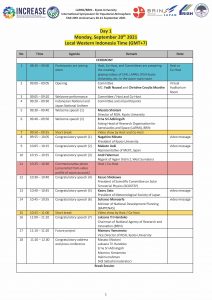 |
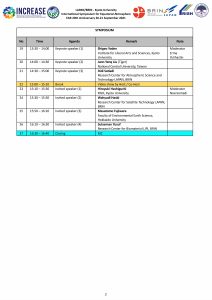 |
| Day 2 | 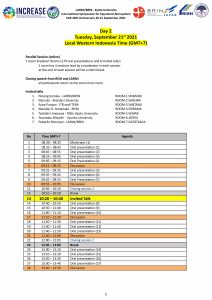 |
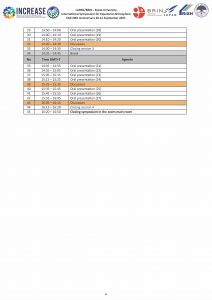 |
PDF file: Schedule_of_Ceremony_and_Symposium. (0916ver)
PDF file: 2nd Day Parallel Session schedule_All Rooms
Zoom ID and Passcode
PDF file: Zoom ID and Passcode list
(20 Sep. Ceremony / Symposium / 21 Sep. Parallel Session)
Registration for Participants
Please register from the following form:
★https://ear20.lapan.go.id/#register★
Abstract Submission
All papers must be original and not simultaneously submitted to another journal or conference. Please read carefully the following guidelines before submitting your paper
Abstract Submission: submit a paragraph with 150-300 words long. The abstract does not need special formation.
The submission’s deadline is 15 July 2021.
Full Paper Submission: the paper must contains the following sections: Abstract, Introduction, Data and Methods, Result and Analysis, Conclusion, Acknowledgement (optional), and References. Author(s) should follow Springer proceeding paper formation.
Please register and submit abstracts from the following form:
★Registration and Abstract Submission Form★
Please download the Full paper format (MS Word) below:
★Extended Abstract (Full Paper) Template★
ARN symposiums from 2016 to 2020
- 5th ARN Symposium Online
Date: December 22-23, 2020
Venue: Online
- 4th ARN Symposium in Nanjing, China
Date: 26-27 December 2019
Venue: Nanjing International Conference Hotel, Nanjing, China
- 3rd ARN Symposium in Taichung Taiwan
Date: 25-27 September 2018
Venue: National Chung Hsing University, Taichung, Taiwan
- 2nd ARN Symposium in Kyoto, Japan
Date: 19 – 21 July 2017
Venue: Kyoto University Uji Obaku Plaza, Kyoto Japan
- 1st ARN Symposium in Penang, Malaysia
Date: 20 – 21 February 2017
Venue: Universiti Sains Malaysia (USM), Penang, Malaysia
Co-Chair: Mamoru Yamamoto, RISH, Kyoto University
Halimurrahman Mukri, National Institute of Aeronautics and Space (LAPAN)
Contact
ARN Secretariat
Research Institute for Sustainable Humanosphere, Kyoto University
E-mail: arn+s2021(at)rish.kyoto-u.ac.jpparallel


